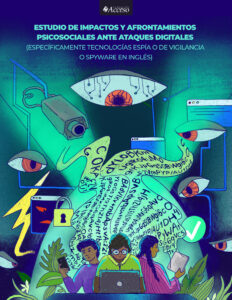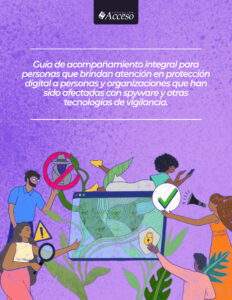[English]
Psychosocial Impacts of Spyware and Holistic Support Guide
Spyware and other surveillance technologies have become powerful tools of control, often used against journalists, human rights defenders, and organizations working for justice. Beyond their technical effects, these attacks generate deep psychosocial consequences (fear, mistrust, isolation, and exhaustion) that affect individuals, teams, and entire communities.
The Study on Psychosocial Impacts and Coping Strategies in the Face of Digital Attacks explores how targeted surveillance and digital threats affect people emotionally, socially, and professionally. Based on interviews and participatory research in Latin America, the study identifies patterns of stress, trauma, and collective responses that emerge from prolonged exposure to digital persecution. It highlights the importance of recognizing these experiences not only as technical incidents but also as human and political ones.
Building on those findings, the A Holistic Support Guide for Those Providing Digital Protection Accompaniments offers practical orientations for those accompanying victims or survivors of spyware and other surveillance technologies. It introduces approaches that integrate emotional, psychological, and technical care, and proposes strategies for communication, containment, and referral. The guide also emphasizes the importance of self-care and peer support among digital security practitioners, who can themselves experience emotional fatigue or secondary trauma.
Together, these materials aim to bridge technical and psychosocial fields, encouraging more holistic and sustainable responses to digital threats. They invite organizations, helplines, and support networks to strengthen their capacity to respond not only to the technical aspects of an attack but also to the human impacts that follow.
Both resources are currently available in Spanish, with English and Portuguese versions coming soon. You can access them through the link provided or by visiting our website.
[Spanish]
El spyware y otras tecnologías de vigilancia se han convertido en poderosas herramientas de control, que a menudo se utilizan contra periodistas, defensores de los derechos humanos y organizaciones que trabajan por la justicia. Más allá de sus efectos técnicos, estos ataques generan profundas consecuencias psicosociales (miedo, desconfianza, aislamiento y agotamiento) que afectan a las personas, los equipos y comunidades enteras.
El estudio sobre los impactos psicosociales y las estrategias de afrontamiento ante los ataques digitales explora cómo la vigilancia selectiva y las amenazas digitales afectan a las personas a nivel emocional, social y profesional. Basándose en entrevistas e investigaciones participativas en América Latina, el estudio identifica patrones de estrés, trauma y respuestas colectivas que surgen de la exposición prolongada a la persecución digital. Destaca la importancia de reconocer estas experiencias no solo como incidentes técnicos, sino también como incidentes humanos y políticos.
A partir de estos hallazgos, la Guía de apoyo integral para quienes brindan acompañamiento en protección digital ofrece orientaciones prácticas para quienes acompañan a víctimas o sobrevivientes de spyware y otras tecnologías de vigilancia. Presenta enfoques que integran la atención emocional, psicológica y técnica, y propone estrategias de comunicación, contención y derivación. La guía también hace hincapié en la importancia del autocuidado y el apoyo entre pares entre los profesionales de la seguridad digital, quienes pueden experimentar fatiga emocional.


You can now download the Study on the Psychosocial Impacts of Spyware and the Guide for Psychosocial Accompaniments in Spanish.
Puede descargar ambos documentos en su versión en español:
English and Portuguese versions of both documents will be available soon. If you’d like to receive them as soon as they are released, please subscribe using the form below: